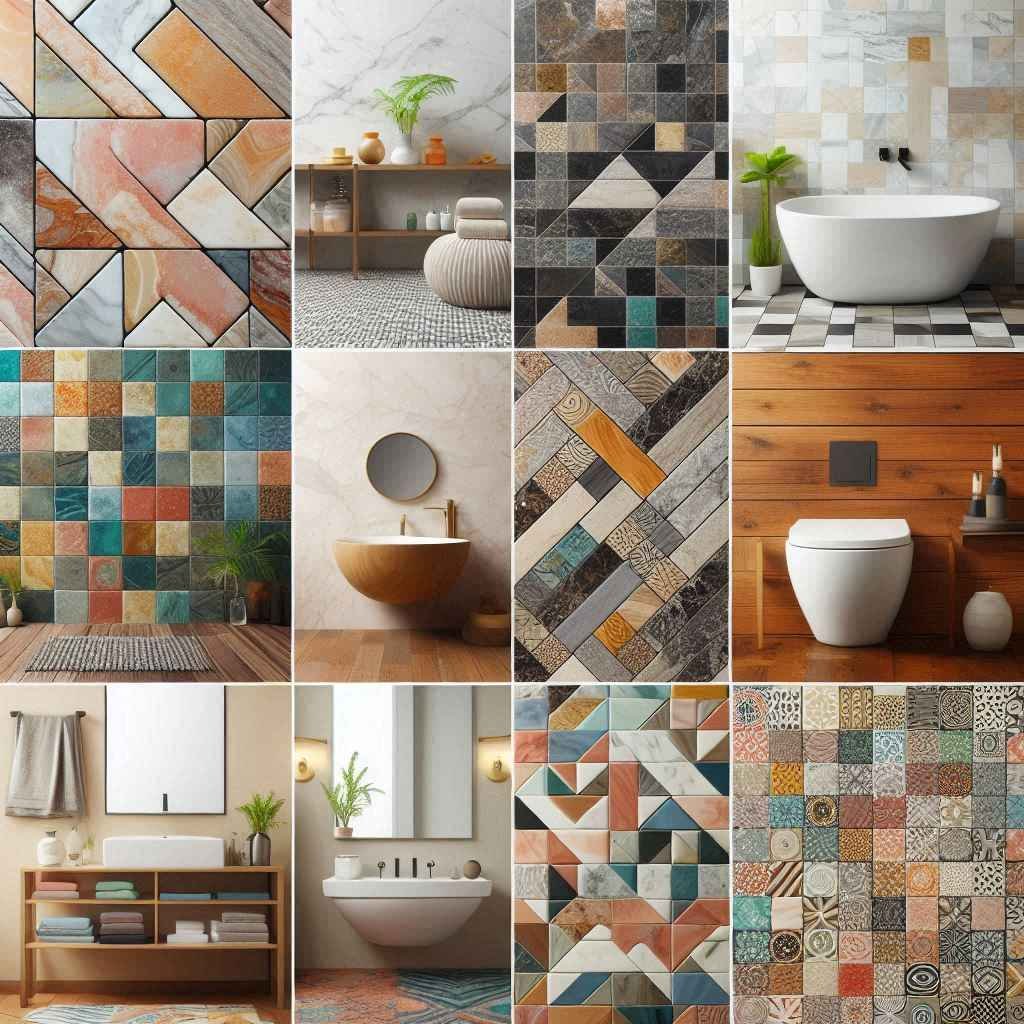Choosing the right bathroom flooring is crucial for both style and practicality. The bathroom is a unique space that requires flooring to withstand moisture, provide safety, and complement your home’s decor. This comprehensive guide will help you navigate the options and find the perfect flooring for your bathroom.
Why Bathroom Flooring Matters
The flooring you choose can transform your bathroom’s look and feel. It needs to handle splashes, spills, and humidity while offering comfort underfoot. The right flooring enhances safety, simplifies maintenance, and adds value to your home.
Are you ready to find the ideal flooring for your bathroom? Let’s explore your options!
Factors to Consider When Choosing Bathroom Flooring
1. Water Resistance
Bathrooms are wet environments, so water-resistant flooring is essential.
- Waterproof Materials: Look for materials like ceramic tiles, porcelain tiles, vinyl, and certain stones that resist water.
- Avoid Porous Options: Unsealed wood or carpet can absorb moisture and lead to problems like mould.
2. Safety
Preventing slips and falls is a priority.
- Slip Resistance: Choose flooring with a textured surface or slip-resistant ratings.
- Matte Finishes: Glossy surfaces can be slippery when wet.
3. Durability
Your bathroom floor should withstand daily use.
- High Traffic Tolerance: Materials like porcelain tiles are known for their strength.
- Scratch and Stain Resistance: Consider how the flooring holds up against scratches and stains.
4. Maintenance
Easy-to-clean flooring saves time and effort.
- Low Maintenance Options: Tiles and vinyl are generally easy to maintain.
- Sealing Requirements: Some materials need regular sealing to stay protected.
5. Comfort
Consider how the flooring feels underfoot.
- Warmth: Materials like cork or vinyl are warmer than stone tiles.
- Underfloor Heating Compatibility: If you plan to install heating, ensure the flooring is suitable.
6. Aesthetics
Your flooring should match your style.
- Colour and Design: From natural stone looks to vibrant patterns, choose what suits your taste.
- Size and Shape: Larger tiles can make small bathrooms appear bigger.
7. Budget
Stay within your financial limits.
- Material Costs: Prices vary widely between materials.
- Installation Expenses: Some flooring requires professional installation, adding to the cost.
Popular Bathroom Flooring Options

1. Ceramic and Porcelain Tiles
Benefits
- Waterproof: Ideal for wet areas.
- Durable: Long-lasting and resistant to wear.
- Variety: Available in numerous styles, colours, and sizes.
Considerations
- Cold Surface: Can feel chilly; consider rugs or underfloor heating.
- Grout Maintenance: Grout lines may need sealing and cleaning to prevent mould.
2. Vinyl Flooring
Benefits
- Affordable: Budget-friendly choice.
- Waterproof: Excellent for bathrooms.
- Comfortable: Softer underfoot than tiles.
Considerations
- Durability: May not last as long as tiles.
- Appearance: Higher-end vinyl looks great, but cheaper options may look less authentic.
3. Natural Stone Tiles
Benefits
- Luxurious Appeal: Adds elegance and value.
- Unique Look: Natural variations make each floor one-of-a-kind.
Considerations
- Cost: More expensive than other options.
- Maintenance: Requires sealing to protect against stains and water.
4. Engineered Wood Flooring
Benefits
- Warmth and Beauty: Offers the look of wood with better moisture resistance.
- Stability: Less likely to warp than solid wood.
Considerations
- Water Resistance: Not entirely waterproof; spills should be wiped up promptly.
- Cost: Can be pricier than laminate or vinyl.
5. Laminate Flooring
Benefits
- Cost-Effective: Cheaper alternative to hardwood.
- Easy Installation: Often features click-lock systems.
Considerations
- Moisture Sensitivity: Not all laminates are suitable for bathrooms; choose water-resistant types.
- Lifespan: May not be as durable as other materials.
6. Cork Flooring
Benefits
- Eco-Friendly: Sustainable and renewable resource.
- Comfortable: Soft and warm underfoot.
Considerations
- Water Resistance: Needs proper sealing to prevent water damage.
- Durability: Can be susceptible to dents and scratches.
Tips for Choosing the Right Flooring
1. Evaluate Your Bathroom’s Specific Needs
- Usage: Is it a family bathroom, guest bathroom, or en-suite?
- Moisture Levels: Bathrooms with showers have higher humidity.
2. Consider Installation
- Professional vs. DIY: Some flooring requires skilled installation.
- Time and Effort: Factor in the time you can dedicate to the project.
3. Test Samples
- Visual Appeal: See how samples look with your lighting and decor.
- Texture: Feel the surface to ensure comfort and safety.
4. Think Long-Term
- Quality Over Price: Investing in quality materials can save money in the long run.
- Resale Value: High-quality flooring can increase your home’s value.
5. Check Compatibility with Underfloor Heating
- Enhance Comfort: Underfloor heating adds luxury and warmth.
- Flooring Suitability: Not all materials are compatible; check manufacturer’s guidelines.
Environmental Considerations
- Sustainable Materials: Options like bamboo and cork are eco-friendly.
- Recyclable Products: Some vinyl flooring is recyclable.
- Low VOCs: Choose flooring with low volatile organic compounds for healthier indoor air.
Summary Table
| Flooring Type | Water Resistance | Durability | Maintenance | Comfort | Cost |
| Ceramic/Porcelain Tile | Excellent | High | Moderate (grout) | Cold underfoot | Moderate to High |
| Vinyl Flooring | Excellent | Moderate | Easy | Warm | Low to Moderate |
| Natural Stone | Good | High | Requires sealing | Cold | High |
| Engineered Wood | Moderate | Moderate | Needs care | Warm | Moderate to High |
| Laminate Flooring | Varies | Moderate | Easy | Warm | Low to Moderate |
| Cork Flooring | Moderate | Moderate | Needs sealing | Soft/Warm | Moderate |
Conclusion
Selecting the right bathroom flooring involves balancing style, functionality, and budget. By considering factors like water resistance, safety, durability, and maintenance, you can find flooring that meets your needs and enhances your bathroom’s beauty. Remember to test samples, think long-term, and don’t hesitate to seek professional advice.
FAQs
Ceramic and porcelain tiles are among the most durable options for bathrooms due to their hardness and water resistance.
Yes, vinyl flooring is an excellent choice for bathrooms. It’s waterproof, affordable, and comes in various designs.
Solid hardwood is not recommended for bathrooms due to moisture sensitivity. However, engineered wood flooring can be used if properly installed and maintained.
Natural stone requires regular sealing to protect against stains and water. Clean with pH-neutral cleaners and avoid harsh chemicals.
Ceramic and porcelain tiles are ideal as they conduct heat well. Some vinyl and engineered wood flooring are also compatible but always check manufacturer recommendations.




